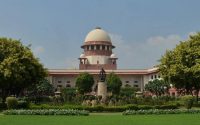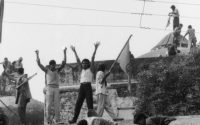Jamiat Ulema-e-Hind files review petition against SC’s Ayodhya verdict.
Source – jagranjosh.com
Jamiat Ulema-e-Hind has filed a review petition against the Supreme Court’s Ayodhya verdict, in which the court granted the disputed Ayodhya land to the Hindu parties and ordered allotment of 5 acres of alternate land to the Muslim parties. The Muslim body filed for review of the order on December 2, 2019 on behalf of the entire Muslim community.
The review petition has been filed for certain parts of the court order. The Muslim body stated that none of the Muslim parties had wanted allotment of alternate land. The All India Muslim Personal Law Board (AIMPLB) is also expected to file a review petition before December 9. The Sunni Waqf Board, however, has decided not to review the judgement.
Jamiat Ulema-e-Hind observed in its petition that though the apex court had condemned the demolition of the Babri Masjid and its domes by the Hindu parties, it still awarded the disputed land to the very parties and thereby condoned the illegal acts.
Ayodhya dispute: Review Petition
The Muslim body argued that the Hindu parties had based their claims on a series of illegal acts. Jamiat Ulema-e-Hind, however, clarified that not all findings of the court are being challenged.
The Muslim body challenged that the main contention in the dispute case was that the Mosque was built after destroying a temple but there is no evidence that proves the same and even the court in its judgement agreed to that and hence, the title of Muslims was proven, yet, the final verdict was the opposite.
The review petition has sought a stay on the implementation of the Ayodhya verdict by highlighting the following errors in the apex court’s judgement:
1. The Supreme Court by giving the title to the Hindu parties rewarded the crimes committed in 1934, 1949 and 1992, when it had ruled that the acts of destruction of the mosque were illegal.
2. The court disregarded the basic principle that no person should derive any sort of benefit from illegality by granting the disputed land wholly to the Hindu parties.
3. The court wrongly applied Article 142 of the Constitution, as complete justice would have only prevailed if it had directed the reconstruction of the Babri Masjid.
4. The court erred by not seeing that the structure in question was always a mosque and had been in possession of the Muslims.
5. The court equated illegal acts of destruction and trespassing by Hindu parties to their assertion of claim over the disputed site.
6. The court erred in not seeing that the Babri Masjid was the property of the Waqf board.
7. The apex court erred did not fairly evaluate the evidence and gave precedence to the oral testimonies by the Hindu parties.
Background
The All India Muslim Personal Law Board and the Jamiat Ulama-i-Hind announced on November 17, 2019 that they would be filing a review petition against Supreme Court’s Ayodhya verdict.
The two Muslim bodies defended their decision by saying that the land on which mosque existed cannot be given up under the Sharia law. The All India Muslim Personal Law Board stated that building the same mosque at some other site is also not permissible as per Islamic law.
The Sunni Waqf board, however, clarified that they would not be filing a review petition. The Sunni Waqf Board as well as the main litigant, Iqbal Ansari, distanced themselves from the All India Muslim Personal Law Board’s decision of filing the review petition.
All India Muslim Personal Law Board’s statement
The All India Muslim Personal Law Board stated after its Working Committee meeting in Lucknow that it was against accepting the allocation of 5 acres of alternate land for the mosque. The board said that allocating alternate land does to equate to repairing the damage caused and it will also not balance the situation. The board claimed that there were many contradictions in the verdict.
Jamiat Ulama-i-Hind’s statement
The Jamiat Ulama-i-Hind stated that it would be filing a review petition soon, as it felt that the verdict was not based on evidence and logic. Jamiat’s M Siddiq was one of the original petitioners in the Ram Janmabhoomi-Babri Masjid case.
Supreme Court’s Ayodhya Verdict
The Supreme Court, in its historic verdict on November 9, 2019, had ordered the centre and the Uttar Pradesh state government to allocate 5 acres of alternate land to the Sunni Waqf board to build the mosque.
The Supreme Court had ruled that while the demolition of Babri Masjid was a violation of the law, it was undisputed that Ram was born in Ayodhya and that there was a structure underneath the mosque.
The court upheld the claim of the Ram Janmabhoomi Nyas that the disputed Ayodhya site was the birthplace of Ram and directed the centre to form a trust to oversee the construction of a Ram temple on the land.
According to the court’s order, the whole of the disputed land will be given to the Hindu parties to build the ram temple, while alternate 5 acres will be given to the Muslim parties for the construction of the mosque.
Before pronouncing the judgement, the Supreme Court had clarified that its judgement will not be based on faith but based on evidence.



